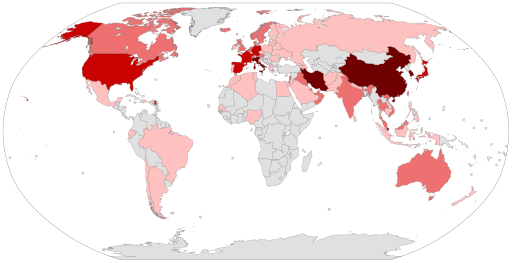
Seven DePauw students who are studying in Italy have been relocated, due to the coronavirus, according to Mandy Brookins, associate dean of experiential learning.
Five of the seven students had their programs suspended. One student planned to visit Rome, but was redirected to Berlin. Another student wanted to visit South Korea, but deferred the program.
The levels of the coronavirus outbreak are determined by the CDC and are based on the number of cases and the threat the virus poses to the specific region or country. The CDC lists the three types of notices: watch-level one, warning-level two and alert-level three.
Italy is at a level three alert, Brookins said.
Students who were impacted while studying abroad will remotely complete their studies, Brookins said.
There have been no reported cases of the coronavirus in Indiana or at DePauw University, according to an email from Alan Hill, Vice President of Student Academic Life. “No students have the coronavirus. We have asked all the students who have returned from Italy to quarantine themselves for 14 days before coming to DePauw if they choose to go to DePauw,” Brookins said.
Hill’s email also said that although there are no reported cases in the state, “we continue to prepare for a potential outbreak or pandemic.”
As preparation and future planning continues, Brookins wants students to take precautions while planning for travel during spring break. “I would highly recommend students to reconsider their travel if they are planning on going to Italy or anywhere that the CDC identified as a high-risk area,” Brookins said. “As far as DePauw is concerned, our policy is going to be asking students who go to a level 2 lor level 3 CDC alert location which would be Japan, China, South Korea, and Iran to self-quarantine for 14 days.”
Self-quarantine includes coming back to your home state, staying there for two weeks and monitoring symptoms such as a fever, Hill said.
Further information regarding the 14-day self quarantine came from Hill’s email as he said, “Students who travel and return from a CDC level 2 or 3 country after this update should be aware that faculty members may enforce their attendance policies during the 14 day quarantine period.”
Hill’s email to the student body also encouraged caution while traveling, “The coronavirus situation is evolving rapidly and all travelers, especially in or around the areas most affected by COVID-19, need to be aware of the possibility that new travel restrictions, transportation cancelations, or periods of required isolation could be put in place while travelers are overseas.”
Brookins encourages students whose travel plans could be impacted by the virus to purchase travel insurance. “I highly recommend students if they haven’t already purchased a comprehensive travel cancellation insurance, it may not recover all costs related to the coronavirus if their travel guide but it could help recover some costs,” Brookins said.
In regards to tuition costs, Brookins said students may not be able to be refunded. “They may receive some refund compensation from their host program for any housing costs they didn’t incur, but as far as tuition goes, they’re still earning credit for their semester, so there would be no reason to actually refund tuition costs,” Brookins said.
In order to protect yourself and others from the spread of the coronavirus, Brookins offered advice to students in order to stay healthy. “Make sure to wash your hands, practicing good hygiene,” Brookins said. “If you’re traveling for Spring Break, make sure you do everything you can to keep your immune system healthy, and make good choices.”
